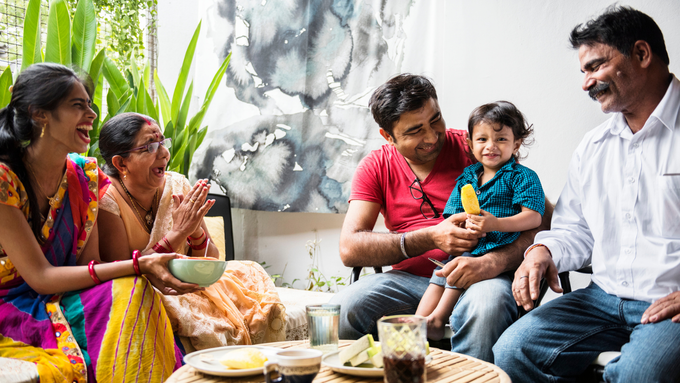The United States of America, often regarded as one of the most powerful and influential countries in the world, holds significant sway in global affairs. Its decisions can impact the world economy, and the pride that Americans feel in their country is evident. American culture has permeated societies across the globe, including India. However, there are several aspects of Indian culture that not only make us proud but also offer valuable lessons for Americans.
Marriage: A Sacred Bond, Not a Contract
In India, marriage is not just a legal contract; it is a sacred bond that involves deep emotional and spiritual commitments. The rituals, whether it’s the seven vows and seven rounds in Hindu weddings or other traditions in different religions, symbolize a lifelong commitment. Marriage in India is about enduring companionship through thick and thin, not something that is easily dissolved over minor disagreements. In contrast, the concept of marriage in America often appears more transactional, with divorce being a relatively easy option. The Indian approach to marriage, which emphasizes emotional connection and mutual support, is a value that Americans could benefit from embracing.

Living with Parents: A Source of Pride, Not Embarrassment
In many American households, it’s common for children to move out as soon as they reach adulthood. Living with parents is often seen as a sign of dependency or failure to launch. However, in India, living with parents—even after getting a job or starting a family—is a matter of pride, not embarrassment. It reflects strong family bonds and a sense of responsibility towards one’s parents. As Aishwarya Rai once famously responded to an American talk show host’s taunt, “We Indians don’t have to make an appointment to have dinner with our parents like you guys do.” This close-knit family structure fosters a deep sense of belonging and emotional support, something that could enrich American family life.

Caring for Elderly Parents: A Family Responsibility, Not a Burden
In the U.S., it’s not uncommon for elderly parents to live in nursing homes, as children are often too busy with their own lives to care for them. In contrast, in India, caring for ageing parents is seen as a natural responsibility. Children take care of their parents and grandparents with the same love and attention they receive as children. This includes managing their health, providing for their needs, and ensuring their comfort. The Indian tradition of caring for elders could teach Americans the importance of family loyalty and the emotional rewards of maintaining strong intergenerational bonds.

Meeting Loved Ones: No Appointments Needed
In American culture, even close family members often need to schedule appointments to meet each other. The concept of dropping by unannounced is almost unheard of. In India, however, family members and close friends don’t need an invitation to visit. Whether it’s an uncle’s house or a cousin’s place, people arrive with a sense of entitlement, knowing they will be welcomed with open arms. This spontaneous and warm approach to social interactions nurtures relationships and strengthens the family unit, something that could add warmth and closeness to American familial relationships.

Hospitality: Guests are Never Left Hungry
Indian culture places immense importance on hospitality. Guests, whether they are close friends or distant acquaintances, are always offered food and refreshments. It’s considered disrespectful to let a guest leave without feeding them. This is in stark contrast to some cultures where offering even a glass of water to a visitor isn’t always a given. The Indian tradition of treating guests with the utmost care and generosity is a practice that could greatly enhance the sense of community and kindness in American society.

Respecting Elders: A Fundamental Value
In many parts of the world, including the U.S., people often address each other by their first names, regardless of age. While this can be seen as a form of equality, it sometimes leads to a lack of respect for elders. In India, respect for elders is deeply ingrained in the culture, and this is reflected in the language itself. Indians use respectful terms like “Ji,” “Sir,” “Ma’am,” or regional equivalents when addressing someone older. This practice of maintaining a respectful boundary is something that Americans could adopt to foster greater respect and consideration in their interactions.

Strong Family Bonds: The Heart of Indian Culture
The importance of family in Indian culture cannot be overstated. Family bonds in India are often stronger than in many Western cultures, where individualism sometimes overshadows familial responsibilities. In India, the family is the central unit of social life, and decisions are often made with the family’s well-being in mind. This collective approach to life, where family members support each other emotionally and financially, could be a valuable lesson for American society, where the focus on individual achievement sometimes comes at the expense of family unity.

Celebrating Diversity: Unity in Variety
India is a land of immense diversity, with multiple religions, languages, and cultures coexisting peacefully. This diversity is celebrated through various festivals, traditions, and rituals that bring people together, fostering a sense of unity and respect for different cultures. While the U.S. is also a melting pot of cultures, the Indian way of celebrating diversity, where different communities maintain their unique identities while coexisting harmoniously, offers a valuable lesson in fostering inclusivity and unity in diversity.

Emphasizing Education and Values
Indian culture places a strong emphasis on education, not just in terms of academic achievement but also in instilling values such as respect, humility, and responsibility. From a young age, children are taught the importance of respecting elders, helping those in need, and upholding family honor. These values are reinforced through stories, religious teachings, and family traditions. While academic education is also valued in the U.S., the Indian focus on character-building and moral education could contribute to a more well-rounded and ethically conscious society.

Spirituality: A Way of Life
Spirituality is deeply embedded in Indian culture, influencing daily life, traditions, and even interpersonal relationships. Whether it’s through yoga, meditation, or religious practices, spirituality in India is not confined to religious rituals but is a way of life. It teaches individuals to find inner peace, live in harmony with others, and approach life with humility and compassion. The growing interest in yoga and meditation in the U.S. is a testament to the value of these practices. However, incorporating the broader spiritual principles of Indian culture could help Americans lead more balanced, fulfilled lives.

Conclusion
While America’s global influence is undeniable, several aspects of Indian culture offer valuable lessons in living a more connected, respectful, and fulfilling life. From the sanctity of marriage to the importance of family, respect for elders, and the celebration of diversity, these Indian values can enrich not only individual lives but also the broader society. By embracing these lessons, Americans can cultivate stronger family bonds, a deeper sense of community, and a more harmonious way of living.


